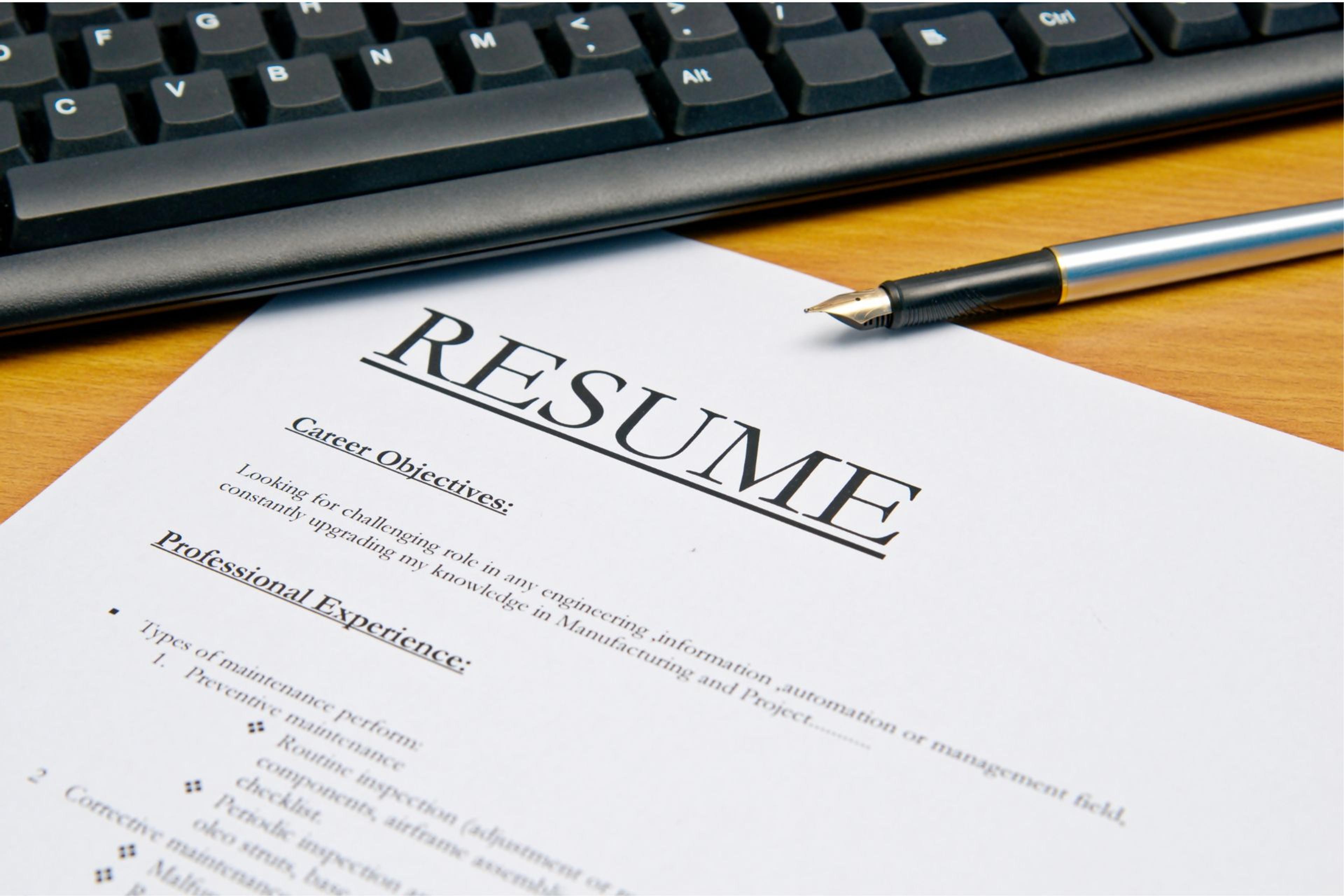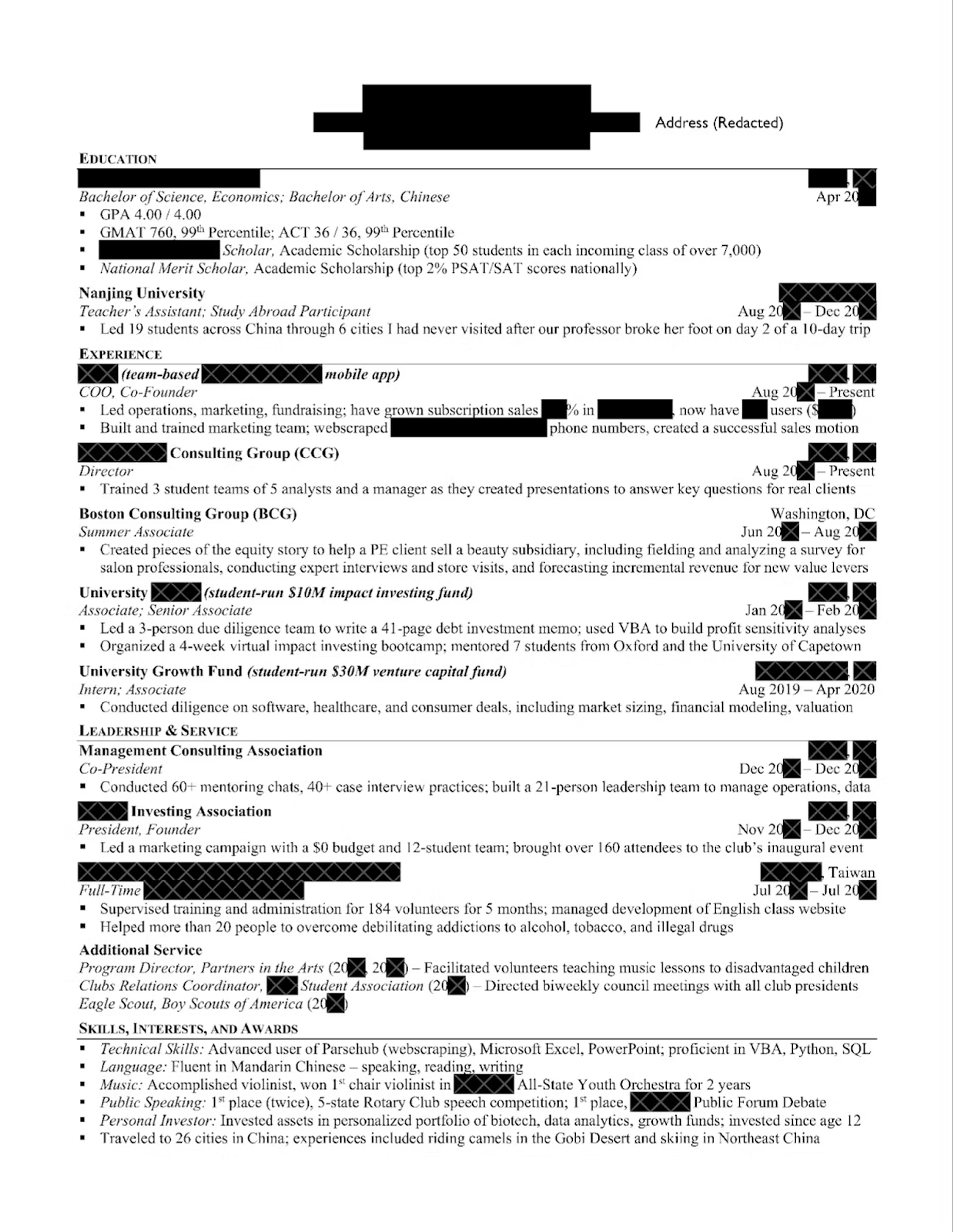Consulting Resume Guide: Templates, Examples, and What MBB Looks For
Craft a consulting resume that stands out to MBB and top firms. Get expert tips, real examples, and proven strategies to land interviews.
Posted July 30, 2025

Table of Contents
Breaking into management consulting is hard, and your resume is often the first (and only) shot you get to make an impression. With thousands of applicants targeting firms like McKinsey, Bain, and BCG, a generic resume won’t cut it. You need a clear, tailored, results-driven document that shows you already think like a consultant.
In this guide, you’ll get management consultant resume examples, expert-backed formatting tips, and real strategies for how to highlight the skills, experience, and results that top firms want to see. Whether you're applying to MBB, a boutique firm, or launching your management consulting job search with Deloitte, this resource will help you craft a high-quality resume that gets past screeners and into interviews.
Read: A Day in the Life of a Consultant – Monday to Friday (From a McKinsey BA)
Why Your Management Consulting Resume Matters More Than You Think
Your management consulting resume is more than a formality—it’s a strategic document. Consulting firms use it to screen for structured thinking, quantifiable results, and leadership potential.
Unlike generic resumes, the best consulting resumes demonstrate:
- A sharp focus on problem-solving and measurable results
- Clear alignment with the job description of a strategy consultant or management consultant
- Evidence of project management, data analysis, and stakeholder management
- A professional, minimalist format that is ATS-friendly and readable by both humans and resume screeners
Pro tip: Consultants speak in outcomes, not responsibilities. Every bullet point on your resume should reflect impact, not just activity.
How to Structure Your Consulting Resume
1. Personal Information
What to include:
- Full name
- Professional email (e.g., firstname.lastname@gmail.com)
- Mobile number
- Location (city + state/country)
- LinkedIn profile (custom URL preferred)
Avoid photos, birthdates, pronouns, or overly designed headers. Keep formatting simple—no color blocks or sidebars.
Expert Tip: Use a consistent header across your resume and cover letter for a polished, unified application.
2. Education
This section matters a lot—especially if you're an undergraduate, early-career professional, or applying to MBB. Consulting firms are highly pedigree-conscious, but it’s not just about the school name.
Include:
- University name, degree, graduation year
- GPA (if ≥ 3.5)
- SAT/ACT or GMAT/GRE scores (if strong)
- Honors (e.g. summa cum laude, Dean’s List)
- Select coursework (if relevant to consulting or industry focus)
- Leadership roles or awards (briefly listed)
Strategic Advice: Weak SAT/ACT? Take the GMAT and list it. A 700+ GMAT score is a strong signal for analytical skills and quantitative rigor.
3. Professional Experience
This is the most scrutinized section of your consulting resume. Every bullet should show you're already thinking like a consultant: problem-solving, quantifying impact, and driving outcomes.
Use the XYZ formula for every bullet point:
- X: What you accomplished
- Y: What it drove (results)
- Z: How you did it
Strong Example: “Reduced operational costs by 18% by designing and implementing a vendor scorecard system across 3 departments.”
Avoid: passive, vague language like “Supported team with...” or “Involved in client meetings.”
Checklist for each bullet point:
- Starts with a strong action verb
- Includes quantifiable results (%, $, or timeframe)
- Shows relevant consulting skills (leadership, analysis, communication)
- Fits in one line
Advanced Tip: Bold the results in each bullet to make the impact pop visually. Example: “Increased conversion rate by 25% through redesigning the sales playbook.”
4. Leadership & Extracurriculars
Consulting firms want people who show initiative beyond the classroom or office. This section helps recruiters assess soft skills, commitment, and culture fit, especially for junior consultants or those without full-time experience.
What to include:
- Leadership roles in clubs, nonprofits, or teams
- Competitive sports, music, or debate
- Organizing events, founding initiatives, or launching a side project
- Measurable impact (funds raised, members recruited, results delivered)
Example: “President, Women in Business Club — Grew membership by 60%, launched 4-part speaker series with Fortune 500 execs.”
Pro Tip: If you don’t have formal leadership roles, highlight sustained involvement and contribution—initiative is what counts.
5. Additional Skills
This is your chance to differentiate and reinforce relevance to the consulting job.
Include:
- Technical skills: Excel, SQL, Tableau, Python, PowerPoint, Alteryx
- Languages: Only if conversational or fluent
- Certifications: PMP, CFA, Lean Six Sigma, etc.
- Other: Public speaking, case competition wins, consulting industry-specific tools
Be strategic: Only list skills that would be used in a consulting project. Avoid filler like “Microsoft Word” or “Google Docs.”
Bonus: The Consulting Cover Letter (Still Matters)
While your resume shows what you've done, your cover letter answers why consulting, why this firm, and why you now. It's especially important for career switchers or non-traditional candidates.
Structure it like a mini case:
- Paragraph 1: Why you're excited about this firm (tailored + specific)
- Paragraph 2: How your experience matches the firm’s values or practice areas
- Paragraph 3: Why now, and why you’re ready to contribute
Tactical Tip: Mention the firm’s industry focus (e,.g. healthcare, digital transformation, or emerging markets) and how your background adds value. It shows you’ve done your research and thought about fit.
Read: How to Write a Consulting Cover Letter (Template + Examples from MBB Admits)
What to Know About Management Consulting Resume Templates
Most resume templates on the internet aren’t built for consulting, and using the wrong one can hurt your chances more than help them. Top firms like McKinsey, BCG, Bain, and Deloitte expect a very specific resume format that reflects your ability to communicate clearly, prioritize information, and follow professional norms. Your resume should look like a consulting slide: clean, structured, and easy to scan.
The best consulting resumes aren’t flashy—they’re minimal, black-and-white, and focused on content over design. Fancy templates with multiple columns, icons, colors, or heavy graphics might look modern, but they can break in applicant tracking systems (ATS) and frustrate human screeners who are scanning quickly for impact and structure.
What the Best Templates Include:
- One-column layout with clear section headings (Education, Experience, Leadership, Skills)
- Consistent formatting for dates, locations, and titles
- One page only, even for MBA students and experienced consultants
- No photos, logos, or color—just black-and-white, PDF format
- Font size between 10–12, using fonts like Arial, Calibri, or Times New Roman
- Bullet points only—never paragraphs
What to Avoid:
- Templates from Microsoft Word or Canva that use tables, text boxes, or dual columns
- Any layout that puts your name or contact info in a sidebar or non-standard location
- Overly spaced-out designs that make it hard to fit strong content on one pageTemplates marketed for “creative professionals” or “modern resumes”—consulting is neither
Pro tip from former BCG recruiter: “The best resumes I screened all looked the same structurally—but the content popped. Don’t try to stand out with design. Stand out with sharp, data-driven bullet points that scream ‘consultant.’”
Want to craft a consulting resume that actually gets interviews? Get Leland’s expert-led resume package—designed by former McKinsey, BCG, and Bain consultants. You'll get a proven template plus personalized feedback from ex-consultants who know exactly what top firms look for.
Consulting Resume Examples
Consulting Resume Example – BCG Summer Associate to Full-Time Offer (US-Based)

What Top Consulting Firms Like McKinsey, Bain, and BCG Look For
MBB and other top management consulting firms look for these resume traits:
| Trait | What It Really Means (and How to Show It on Your Resume) |
|---|---|
| Leadership | Demonstrated ownership over decisions, people, or outcomes. Show times you led a team, launched an initiative, or influenced senior stakeholders. Quantify the scope (e.g., team size, budget, results). Avoid vague titles—emphasize what you led and what happened because of it. |
| Analytical Skills | Evidence of structured problem-solving, data analysis, and decision-making under uncertainty. Include examples of Excel models, financial forecasts, process improvements, or performance dashboards. Highlight insights and impact, not just the tool used. |
| Career Progression | Show a clear trajectory in responsibility, scope, or outcomes. Promotions, title changes, expanded project ownership, or mentorship roles are key signals. Even if in school, you can show growth across internships or leadership roles. |
| Consulting-Relevant Skills | Experiences that simulate what consultants actually do: managing projects, communicating with stakeholders, solving ambiguous problems, and delivering results under tight timelines. Frame your experience in consulting-like language and focus on the client, team, and outcome. |
| Results Orientation | Consulting firms want evidence that you drive impact, not just complete tasks. Use metrics (% improvements, $ savings, time reduced) to quantify results. Replace phrases like “responsible for” with “increased,” “reduced,” “led,” “built,” etc. |
| Structured Thinking | Your resume should feel like a well-structured slide: logical section flow, consistent formatting, and tight, outcome-driven bullets. Avoid clutter. If your formatting is sloppy or inconsistent, it reflects poorly on your attention to detail and thought process. |
| Professional Polish | No typos. No design gimmicks. One page. ATS-friendly formatting. Recruiters expect a resume that looks like a finished product, not a draft. Strong writing, formatting, and clarity signal your readiness to communicate at a client level. |
Your own resume should mirror the type of thinking consultants are known for: structured, hypothesis-driven, and impact-focused.
Consulting Resume Tips That Actually Help You Stand Out
These consulting resume tips go beyond the basics—and align with what hiring managers and former consultants know works:
Use Every Line Strategically
Your resume is one page. That’s non-negotiable—even if you have five years of experience or an MBA. Every line needs to earn its spot by showing value, not filler. Think of your resume like a slide in a consulting deck: concise, structured, and impact-oriented. A line that doesn’t show leadership, problem-solving, or measurable results is wasting space. Avoid generic responsibilities like “Managed a team” or “Attended weekly meetings.” Instead, focus on what you achieved, how you did it, and why it mattered.
Quantify Your Impact
Consulting firms don’t care what you did—they care what changed because you did it. Numbers are how you show that. Every bullet should include a measurable outcome: percent improvement, dollar savings, revenue growth, headcount managed, or time saved. Without data, your claims feel unproven. Saying “Improved onboarding process” is vague. Saying “Cut onboarding time by 40% by redesigning training workflows” tells a clear, results-driven story—and that’s exactly what resume screeners are trained to look for.
Match the Language of the Job
Top firms want to see that you understand the role you’re applying for. That means mirroring the language they use internally and in job descriptions. Consulting resumes should include terms like “problem solving,” “client deliverables,” “stakeholder management,” and “data-driven decisions”—but only where they’re truly relevant. Use these phrases in context, tied to real results. If you led a team, explain the outcome. If you built a financial model, explain the insight it generated. Firms are looking for consultants, not candidates who copy-paste buzzwords.
Design for Skimmability, Not Creativity
Consulting recruiters aren’t looking for design flair—they’re looking for structured thinking and attention to detail. Use a simple, clean black-and-white format with no colors, icons, or fancy fonts. Stick to bullet points (not paragraphs), use consistent formatting, and follow a clear section hierarchy. Your formatting itself is a signal—if it’s messy, inconsistent, or hard to read, firms will assume your work will be the same. And never use resume templates with tables or columns; they often break in applicant tracking systems (ATS), and real resume screeners hate them.
Only List Skills You Can Prove
Soft skills like “team player” or “strong communicator” are meaningless unless they’re backed by evidence. Consulting firms care about communication, but they want to see it through your impact, leadership, and writing quality, not read it in a keyword dump. Instead of listing soft skills in isolation, build them into your bullet points. Show how your communication improved a client outcome or how your leadership influenced a key decision. That’s what real consultants do—and that’s what consulting firms hire for.
Final Thoughts: Build a Resume That Reflects a Great Consultant
A great resume for consulting should reflect the same skills consultants use daily: structured thinking, clear communication, and client-focused problem solving.
Keep it clean, focused, and data-driven. Use resume writing techniques that emphasize value, not just volume. And don’t forget: consulting resumes are as much about what you include as what you don’t. Be selective. Be strategic.
Get Your Consulting Resume Reviewed by a Former Consultant
If you’re serious about breaking into consulting, don’t go it alone. Leland offers personalized support from experienced consultants who’ve worked at McKinsey, Bain, BCG, and more. They know what hiring managers want—and how to help you showcase your relevant experience and outstanding achievements.
Book a consulting resume review with a top management consulting coach today, browse them all here:
See: The 10 Best Consulting Coaches for Case Interviews & Resumes
Read these articles next:
- A Comprehensive Guide to MBB: McKinsey & Co., Boston Consulting Group, and Bain & Co.
- What Do Consultants Do at McKinsey, BCG, and Bain?
- How to Answer the "Why Consulting" Interview Question
FAQs
What does BCG look for in a resume?
- Your BCG resume should highlight your academic accomplishments, from your GPA to any graduation honors. In some cases, you can highlight standout test scores and solid performance in relevant classes (i.e., business and quant).
What does MBB look for in a resume?
- Tailor Your Application: Highlight aspects of your experience that align with MBB values, such as impact, leadership, and problem-solving in complex environments. Seek Feedback: If possible, get feedback on your previous applications to understand any gaps or areas for improvement.
How do you introduce yourself as a consultant example?
- Start by introducing yourself with your name and a brief statement about your academic and professional background. Mention your educational achievements and majors or degrees relevant to consulting, along with any standout experiences that led you to pursue a career in consulting.
How to write a resume as a consultant?
- The best consulting resumes have 5 sections: Personal information, Education, Work experience, Extracurricular achievements, and Additional skills. One of the most common mistakes we see in CVs is not having an "Extracurricular achievements" section.
What is a professional summary for a management consulting resume?
- A resume summary is a 2-4 sentence summary of your professional experiences and achievements. Experienced marketing consultant with a strong background in developing award-winning strategies for a diverse clientele. 5+ years of industry experience includes PPC campaigns, SMM, web design, brand development, and more.












